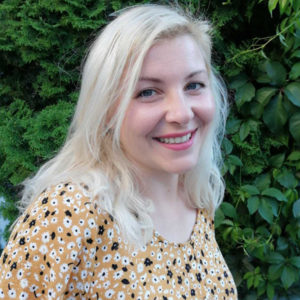Ana Aleksova Tutkovska (North Macedonia)
Art Historian, Directorate for the Protection of Cultural Heritage, North Macedonia
Which site do you associate your first World Heritage memories with?
That would undoubtedly be the “Natural and Cultural Heritage of the Ohrid region”, where I was lucky enough to spend my childhood.
How did your professional journey in the heritage sector begin?
It all started with the art history books of my grandmother from Ohrid. My grandmother was an art historian as well, and I remember vividly looking through her books from a very early age, admiring the Pyramids of Giza, the Colosseum in Rome, the beautiful sculptures of Michelangelo, the impressive paintings of Monet … I frequently visited my grandparents in Ohrid. I walked through the narrow streets in the old town, and witnessed the rich cultural layers of this city. This helped to ignite my love for cultural heritage. Finally, I enrolled in the Department of Art History. My employment in the Directorate for Protection of Cultural Heritage, where I work to this present day, was a logical continuation of this career path.
In your opinion, what are currently the biggest challenges in the heritage sector?
The challenges we face in the heritage sector depend on the system for protection and management of each country individually. Therefore, although certain challenges and problems are common and repeated in many places, there is no “one size fits all”, unified approach, and mostly every approach is place-based. In the case of the Ohrid region, our biggest challenge is the lack of professional staff, as opposed to the rich cultural heritage that abounds in this region. For this reason, the existing staff fails to respond timely and to deal with all challenges and issues we face, which, in turn, leads to deterioration of the state of the cultural heritage and loss of the values and attributes. Moreover, the protection and management of mixed properties, where nature and culture interlink, require an integrated and holistic approach, and we are still developing the methodology and approach to successfully tackle this matter. Another major challenge is raising awareness for the shared responsibility and shared care for the cultural heritage in this region. No law has the power to protect the heritage site, if the owners themselves, the local community, the stakeholders have an ignorant attitude towards its value and significance, and -this is an issue which the national authorities- the local self-government and the civil society need to address urgently.
Which skills do you think will be important in the future for the heritage sector?
Appropriate skills and knowledge, i.e., theory and practice, are necessary for a complete approach to cultural heritage protection because one without the other often leads to a number of failures and shortcomings. Unfortunately, I have the impression that the practice and development of certain skills are often neglected due to various reasons. Above all, I would like to mention the need to preserve and transfer the traditional knowledge and skills for the protection of the cultural heritage since we face the danger of permanent loss of the traditional, original skills, which were used for conservation of cultural heritage, both, tangible and intangible. Nowadays, in Ohrid and the Ohrid region, there are almost no masons skilled for building and restoring traditional Ohrid houses, which in fact speaks volumes about the alarming situation we are in. At the same time, I would list mastering skills for digitization and for sourcing funding opportunities for cultural heritage as priorities, as experience shows that they are among the challenges we face in many parts of the world.
Which advice would you like to give to young heritage professionals?
It takes perseverance, patience, and a lot of love to get through all the challenges and difficulties they will encounter early in their careers, but later on as well. Providing a long-term protection of the cultural heritage in a continuously changing world is a real, global challenge. These days, the Internet has dramatically facilitated our circumstances, with open access to numerous libraries, for networking with colleagues, fast and easy communication, etc. In this regard, I would advise: a continuous consultation of professional literature for self-improvement, and for following the contemporary approaches for protection and management of the cultural heritage. Furthermore, networking with colleagues from around the world to exchange knowledge and experience, through participation in scientific conferences, forums, etc., collaboration with cultural heritage experts, in order to ensure intergenerational cooperation and continuity in the profession. All of these activities are, or would be, of paramount importance to all emerging professionals.

Ana Aleksova
